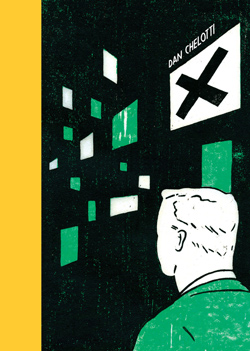
Reviewed August 1, 2013 by Virginia Konchan.
Silly, to search for analogs for the contemporary poet (archivist, documentarian, underwater archaeologist, cipher, bard): the contemporary poet is he or she who remains after the end of the world, blankly propounding music against the breaking-wall of cultural annihilation and anomie. If, as poet Dan Chelotti says, in “The Unbearable Again,” “It takes twenty years / to sufficiently translate / horror into nostalgia,” we are now fully blinkered, or awake, and ready to make, mean or be more than the poetic equivalent of a docent, creating artifactual texts to a time wherein “actuality” (however undeconstructed a fiction), not just the spectacle or kitsch, reigned.
Über-vulnerable to global commodity cycles and other forms of cultural toxicity, perhaps the contemporary poem could be a space for purgation. In Chelotti’s debut collection X (the fourth lodestar from the new McSweeney’s Poetry Series), one wonders if restitution must also restore, not just commodities, but nostalgia for pathos (“If only someone could / remind me how to feel”) in a time when sentiment is everywhere fetishized, made “vintage.” Throughout this collection, the poet questions whether the contemporary lyric remains an epistemology that could help us understand the interaction between people and things: legacies of the modernists’ attempt to ground thought materially (imagism, objectivism).
In image or in word, the origin of the impulse to signify (externalize perception), remains the same: “I cut stars / as you cut letters to spell / white sun, cellophane, / I have never been alone.”
Apollinaire, William Carlos Williams, and Frank O’Hara visit these poems: but the underlying bridge from French symbolism and the Russian novel, to now, is not made of literary ghosts, here, but classical music, before music serialism and electronica rendered euphony and harmony obsolete. Poets and musicians alike have proven incapable of preparing for the future, formally (“I saw it coming / but couldn’t parse it”): the speaker of X both wants to believe classical music (high culture), will save him while knowing it won’t. “The rain says, Listen to Debussy, / go ahead, Debussy will fix you. / But the rain is a liar. / I must listen to Desmond Dekker.” The poet’s express desire is to eat hot dogs and run around the bases, while listening to Mozart’s Sinfonia Concertante in E flat (“They won’t play it,” the poet concludes: the stadium, that is), or, in “Rehearsing Lear in the Rearview Mirror,” to dive into a pool full of early 20th century pornography while all the ghosts sing Brahms’ Liebeslieder waltzes.
Is music not necessary to survival, in a survivalist age, or the only immaterial added or surplus value that can save this world? Depends on who you ask:
[Roosevelt] called Tolstoy
a sexual moral pervert because
of The Kreutzer Sonata, a novella
in which the Beethoven sonata
figures prominently, which
suggest that some music
is so powerful it can change
your internal states
into foreign states.
This is not transubstantiation the speaker is describing, it is transmigration, extradition, border crossing: all occurring beneath the denotative “meaning” of words. Post-pastoral haunts retain their power, albeit on the subatomic level, despite our credulousness and destructive urge: the moon (as a dimly perceived totality) is the speaker’s declared enemy, as a falsely syncretic “whole” occurring outside the self, as with its veils (“There is an order / to the clouds I cannot discern”). What the lion represented to Stevens (prosody’s lethal power) is, for Chelotti, a brute force enfeebled, like a circus animal: impotent and tame, and yet, “while terribly / insufficient” made to “take / on whatever darkness may come.”
The overdetermination of poetic language under capital extends to the individual (“I want to mean more than I can”), a crisis the speaker frames as one not of the all-consuming, impersonal, “it” of capital, but the absence of human subjects who both create meaning and represent its inscription from systems of bureaucratic power: “People used to get off planes and / meet people who held signs for them . . . Now there / aren’t any people left to hold the signs.”
No more placeholders for signification, perhaps, but the poet-conductor-cineaste’s vision is alive and well (“I put a helluva landscape, / gorgeous, barren, / termites in the trees, / and in the forefront, / a rat writhing in its trap”), rhapsodizing the motive (terror) for taxonomic naming (“Because / I don’t know the name of every flower / I fear things”) and its Adamic corrective (“Look at these trees, I am saying— / look at the order a guy can give / to this world of unnamed things”).
While what’s truly “modern” about postmodern poetics may be the trick of deictic “deception” (positing an elsewhere to “here”) via personae (“I am in Germany. I am Paracelsus”), what Chelotti does in X is more than mark our own deterritorialized selves, but consent to act as, in “Slow Dance,” an all-too-human Virgilian guide, to the ultimate unappropriable capital, love:
“So when I look at you sternly,
head slightly bowed,
know what I mean no
tsk tsk. I am
too nervous to say
our love is burning
in some distant hall.
That we should go there now.”